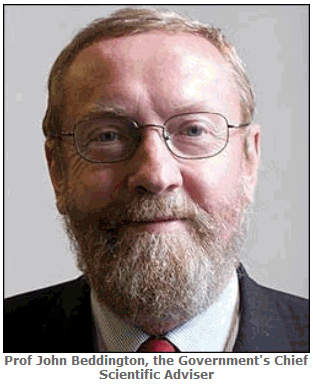
|
|
|
|
|
|
|
News & Views item - September 2008 |
![]() Britain's Chief Science Adviser Pays the US a Visit and Has a Chat to
Science. (September 26, 2008)
Britain's Chief Science Adviser Pays the US a Visit and Has a Chat to
Science. (September 26, 2008)
While the appointment of the next Australian Chief Scientist continues to remain a mystery (the Rudd Labor government has had slightly less than 10 months to determine who will get the yellow jersey), John Beddington, appointed nine months ago to replace David King as UK Chief Scientific Advisor, has paid a short visit to the US.
A population biologist at Imperial College London, Professor Beddington has specialized in applying biological and economic tools to questions of natural resource management, particularly fisheries. Science's news editors caught up with him last week for a short question and answer session.
Some excerpts (not ordered chronologically):
Science: [W]ould you say the Bush Administration has been bad
for science?
J.B.: I wouldn’t really wish to comment on that.
Science: [W]ho do you report to, and how do you pick the issues that you’re working on? Are a lot of them given to you by the prime minister and cabinet, or are there issues that bubble up from the civil service?
J.B: The reporting line formally is to the prime minister [PM] and cabinet, and then from a day-to-day basis, to the Cabinet Secretary Sir Gus O’Donnell. In terms of issues, they come up in a whole variety of ways. For example, I might choose to highlight... other issues can be generated, both from other departments and also from the PM’s office itself... in principle I’m expected to be able to give advice on pretty much any of these issues. And the way I have to do that is to use this network of chief scientific advisers [for the various governmental ministries], organizations like the Royal Society, the Royal Academy of Engineering. On a day-to-day basis, there seems to be more than enough to do.
Science: One of David King’s goals when he was Science Adviser was to increase the use of science advice across all government departments. Is that job done, or have you got more departments to work on?
J.B.: First of all, I agree and have followed on from Dave’s idea; we need to have that. I’ve done a number of things that are slightly different from Dave. The first thing that I’ve done is I’ve brought together the group of [department] chief scientific advisers so that we meet every 6 weeks... We form subgroups: One of those is dealing with climate change and food security issues, and another subgroup we’re planning for the back end of the autumn is going to be dealing with infectious diseases. So, that’s a good bit of networking... [In addition] this group of chief scientific advisers is now meeting with the chief executives of the research councils every 3 months... Clearly, there’s always going to be lots of bilateral discussions, but meeting as a group does, I think, mean that you have a chance to pass information, raise questions. A real community is now starting.
Science: On greenhouse gas emissions, the U.K. government is falling behind its own targets for reducing emissions. How should it catch up?
J.B.: I think the sort of things that we need to be addressing are, obviously, a saving on emissions, but also investment in the sort of technologies that have a chance, in the medium term.
Initial work was on wind, subsequent work on marine, and they’re currently
planning, I believe, work on transport. All of these initiatives are necessary,
but obviously the big one out there, which everybody needs to be addressing, is
CCS [carbon capture and storage]. That really needs very serious investment
because [its] problems are not just with the actual technology but also with the
underlying infrastructure. So, it’s difficult, and we need to address it.
Science: How much is your office involved in budgetary matters, both the overall budget and the way it’s divided between various research councils and higher education?
J.B.: The budget is essentially determined by, in the spending realm, the government. But the Department for Innovation, University, and Skills has a director general assigned to the research councils. The new appointment is Professor Adrian Smith. They’re the ones—the councils and Adrian—that are the people who actually deal with the detailed allocation of budgets. Through the network of chief scientific advisers and my own office, we would be making representations to the treasurer and others to say, "Look, we really believe that this is a particular priority, and so on." But I should say that I’ve not been involved in that yet; the last spending realm was when David King was in the position. So, my detailed experience of it is zero, at the moment.